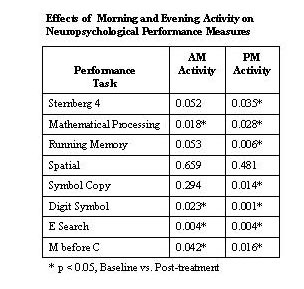
Objective: Reduced exposure to social and physical activity may contribute to impaired sleep and cognition in the elderly. We previously demonstrated that a two week program of exposure to social and physical activity in both the morning and evening improved sleep and performance in older adults. The goal of this study was to determine whether the timing of the intervention was critical to its effects.
Design: Twelve older men and women (74.6 ± 5.5 years of age) were exposed to 14 days of structured activity sessions in the morning or evening, in a repeated measures design. Sessions consisted of stretching, low-impact aerobics, and game playing. Subjective mood, neuropsychological performance tasks, and subjective and objective measures of sleep were assessed at baseline and after the intervention.
Materials and Methods: Each study consisted of a 10-day baseline period including 2 days of testing, a 14 day intervention period in either the morning (9:00 to 10:30 am) or evening (7:00 to 8:30 pm) and 2 days of post-treatment testing. There was a month washout period between each study. Throughout each study, sleep and activity were assessed via wrist worn activity monitors and sleep and activity logs. During the baseline and post-treatment testing, daytime performance, mood, and vigor were assessed every 2 hours throughout the day. Subjective sleep quality was assessed with the Pittsburgh Sleep Quality Index (PSQI) at baseline and post-treatment. Sleep recording with polysomnography (PSG) was conducted on the two baseline and post-treatment nights. All procedures were conducted in the homes of the participants. Changes between baseline and post-treatment measures were assessed by multifactor ANOVA with repeated measures.
Results: Exposure to either morning or evening activity significantly improved daytime neuropsychological performance on both computerized and paper and pencil tests. Activity sessions in the morning improved the throughput on 4 of 8 performance tasks, while 7 of the 8 performance tasks showed improvement following evening activity (Table 1). Subjective sleep quality ratings, measured by the PSQI, improved following activity sessions in either the morning or the evening (p = 0.007). Objective measures of sleep did not improve when measured by actigraphy or PSG.
Conclusion: These results demonstrate that exposure to either morning or evening social and physical activity improves subjective sleep quality and objective measures of neuropsychological performance in the elderly. These results suggest that increasing the total amount of activity, particularly in the evening, may be a useful intervention to improve sleep and daytime function in older adults.
Back to S092 Sleep, Circadian Rhythms and Aging
Back to The Eleventh International Congress